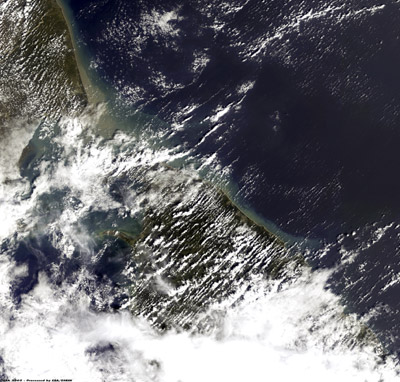Ilankai Tamil Sangam28th Year on the Web Association of Tamils of Sri Lanka in the USA |
|||
 Home Home Archives Archives |
Core IssueTamil Guardian editorial, September 12, 2007
Lumping Sri Lanka's bloody war into the catchall category of 'intra-state conflict', various international policy makers emphatically tell us that the cause of the island's ethnic strife is underdevelopment and poverty. The Tamils are fighting, they maintain, because this 'minority' can't have access to resources. For decades - and from long before the armed struggle began - a succession of Tamil leaders argued that it was the entrenchment of Sinhala chauvinism in the post-colonial state that was making it impossible for us to live as equals. As the state repression and, especially, Sinhala violence against us worsened year by year, Tamil demands changed from power-sharing at the state's centre to regional autonomy and, three decades later, to outright independence. We argued our demands are political, not economic. It is true we were marginalized from the state and denied access to higher education. But that was long after the island was defined as a Sinhala birthright and we were cast as tolerated interlopers. However, it has became vogue, ever since the ferocity of the Tamil armed struggle internationalized the conflict, for Sinhala governments, parroting the rhetoric of international actors, to wax lyrical of the need assuage 'Tamil grievances' - after defeating 'Tamil terrorism' that is. Grievances, like 'peace', mean different things to different people. For us a lasting solution entails we are recognized - by constitutional arrangement - as a people living in our traditional homeland in the island's Northeast. It is not merely one where the Sinhala-dominated state produces its documents also in Tamil or tosses the odd developmental project our way from time to time. Today, the Presidency of Mahinda Rajapakse has dropped all pretences, unleashing an overtly Sinhala war of conquest in the Northeast. Of late, he too has adopted the rhetoric of 'Tamil grievances.' But he deploys the figure of speech with an ineptness that stems from an inability to transcend the Sinhala chauvinism that took over the state with the 1956 'revolution' - as he puts it. Last week, President Rajapakse proudly declared "I was elected primarily by a Sinhala constituency on an election manifesto which made it clear that an ultimate solution to the ethnic crisis could be evolved only on the basis of a unitary state." He went on to muse: "I cannot change history or my own political circumstances overnight... You must remember my political legacy and constraints." That means under no circumstances will he recognise the Tamils as one of the founding peoples of the island. The bloodletting unleashed by the state armed forces under Rajapakse is not, as some international human rights groups insist, merely a 'failure to protect civilians' or 'investigate violators' but a strategic exercise of state terror, an effort to impose the primacy of Sinhala sentiments. True, some Sinhalese are also suffering the regime's wrath - but mainly when they oppose his war efforts. Some international actors, intoning the mantra of underdevelopment and conflict, believe they can ameliorate Tamil frustrations with aid and a few tweaks of the 1972 constitution. To do that, they believe, the LTTE must be first destroyed. The evidence to the contrary is everywhere now. The Rajapakse regime is not interested in their peace plans. Baying for blood, it is not concerned by their moralising or lecturing. It is less concerned about their conditionalities. In short, to their consternation and now undisguised irritation, they are unable to get the Sinhala state to pay the slightest attention to their values or self-declared authority. But ideologically wedded to their theories of conflict, they refuse to acknowledge these disconnects. Instead, blaming the LTTE for the mess, they are redoubling their efforts in Rajapakse's war. But Sri Lanka's crisis began at independence. Its cause was glaringly apparent then. This majoritarian oppression is now fully institutionalised. The international community is manifestly able to dislodge or check these forces, but has convinced itself that aid will cure all. But as Rajapakse himself mockingly put it last week: solving the island's crisis "is not like making instant coffee."
| ||
 This struggle is not about underdevelopment. The core problem in Sri Lanka is the entrenched 'tyranny of the majority' that the 'one-person, one vote' ethos of democracy easily conceals and perpetuates. The core Tamil demand, enshrined in the Thimpu principles, is about the equality amongst ethnic collectives, not just individuals. Any solution will require a radical restructuring of the constitution that the Sinhalese, exploiting their numerical superiority, established in the seventies. It is no accident that out of 225 seats in the Sinhala state's parliament, just over two dozen are allocated to the Northeast.
This struggle is not about underdevelopment. The core problem in Sri Lanka is the entrenched 'tyranny of the majority' that the 'one-person, one vote' ethos of democracy easily conceals and perpetuates. The core Tamil demand, enshrined in the Thimpu principles, is about the equality amongst ethnic collectives, not just individuals. Any solution will require a radical restructuring of the constitution that the Sinhalese, exploiting their numerical superiority, established in the seventies. It is no accident that out of 225 seats in the Sinhala state's parliament, just over two dozen are allocated to the Northeast.